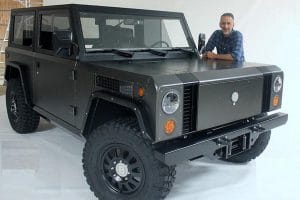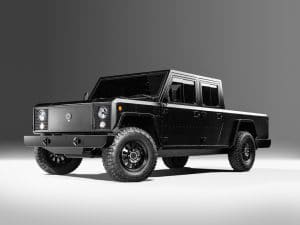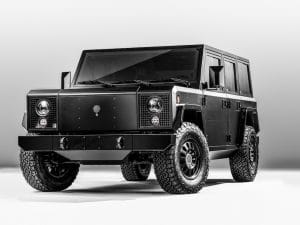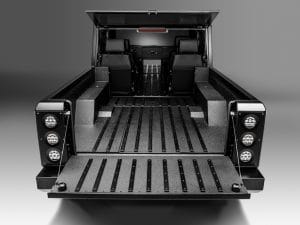Robert Bollinger is an unlikely automotive pioneer. While he started out as an industrial design student, his career took some decidedly eccentric turns in marketing, advertising and then organic hair care products. But it was only when he decided to move to the Catskills and try his hand as a gentleman farmer raising grass-fed beef that he found his true calling.
On the New York farm, Bollinger wanted a rugged truck that also was environmentally friendly. So he decided the best way to get what he needed was to build it himself. What became Bollinger Motors was born. The startup is now based in the Detroit suburb of Ferndale where it is finishing work on two new products, the all-electric B1 SUV and B2 pickup. It also introduced its patent-pending Class 3 E-Chassis today.
Wandering through the company’s suburban Detroit offices,Bollinger took time to chat with TheDetroitBureau.com about his background, his company and its long-term plans.
(Detroit-Area Startup Bollinger Unveils new E-Chassis.)
TDB: You started out wanting to go into the car business but never made it, at least until recently. What happened?
Bollinger: I went to school for industrial design in the ‘80s to be a car designer and went on some interviews in Europe but they said I didn’t know how to design yet. I came back to the U.S. to go to design school but it never happened. I ended up in Manhattan in advertising and marketing, all kinds of stuff, and then started helping a friend with an organic hair care company.
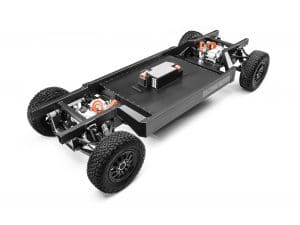
Bollinger Motors unveils patent-pending E-Chassis. world’s only Class 3 electric platform offers commercial applications.
TDB: Not quite the car business. What happened next?
Bollinger: We sold the company and I wound up in the Catskills with a cattle farm (raising) grass fed beef. But the idea of doing a car kept coming back into my head, something electric. But we wanted it do all kinds of stuff off-road, so we spent the next two years building it. And when we revealed it in 2017 we got a great response. We hit a nerve and kept going from there. But it’s hard to get automotive engineers in the middle of nowhere so we moved to Detroit.
TDB: Why electric? And why a truck?
Bollinger: I always found electric motors are a lot more efficient, and it felt like the whole world was going electric. Tesla has done amazing things but I didn’t need a sedan. I wanted a big, heavy, serious truck with all-wheel drive. Remember, this is a Class-3 truck. (Ed: which means a GVW of 10,000 to 14,000 pounds.)
TDB: Why Detroit? Why not Silicon Valley like Tesla and other startup automakers?
Bollinger: Yeah, but a lot of their engineering is done in Detroit. Companies like Tesla want to be near their (source of) funding. But I didn’t want to split offices. I just wanted to be right in the middle of an automotive engineering and vendor support (network). It was just four of us to start but we’ve hired 30 more in a little more than a year and we’re going to hire a lot more. And we also wanted to be close to the engineering services we could work with here.
TDB: Tesla is producing so much of what it needs, in-house, including batteries. And Bollinger Motors?
Bollinger: That would be a huge investment and a big learning curve. One of the good things is there’s now a lot of technology out there that, three years ago, you might not have been able to get.
TDB: And, at the same time, prices are starting to tumble, especially for batteries that used to be $1,000 a kilowatt-hour and now are $200 or less.
Bollinger: Yeah, but we’re going to have a very big battery pack, 120 kWh, so half the price of the vehicle is going to be in the battery pack.
(Bollinger reveals first battery-electric pickup, SUV models.)
TDB: You clearly have your work cut out for you. Not only do you have Tesla the dominant player in battery cars but also other new entrants such as Rivian, and established automakers are also getting serious.
Bollinger: The people who are rooting for us see us as something of an underdog. We know there’s going to be a lot of competition. We knew there would be an electric F-150 one day, and a lot of players we can’t compete with. But there are a lot of different segments to the auto industry. That’s why our trucks are not like what they’re doing.
TDB: Perhaps, but while Tesla comes up with a wild design like Cybertruck, you’ve opted for a squared-off design that is almost painfully old-fashioned, certainly not the sort of aero look most associate with EVs.
TDB: So, if it’s not breaking grounds on design, what’s the selling proposition?
Bollinger: Electric is just one of the things you can say about our truck. It has a huge ground clearance and can hold 16-foot boards (using a pass-through from the front to back). You have a 50:50 weight balance, all-wheel-drive. It has 120-volt electric power for a work site. We have a big inverter so you can run a bunch of power tools. It’s tough enough for hands-on trucking, you can do just about anything with it.
Bollinger: I didn’t want to design a futuristic looking trucks because I think they would wind up looking old and dated pretty quickly. My personal favorite is the old International truck, so that’s the kind of world I was focused on.
TDB: Rivian has a contract for 100,000 delivery trucks from Amazon. What sort of volume will it take for you to succeed? Tesla seems to be targeting millions of vehicles as it adds plants?
Bollinger: We’re targeting low 1,000s, like 2,500 a year. And we’ve already sold out half of that for our first run.
TDB: When do you start rolling it out?
Bollinger: 2021, yeah, before the end of the first half of the year.
TDB: You’re starting out with a heavy-duty pickup and SUV. Will you do other products?
Bollinger: We hope to come back and do a two-door for (more mainstream) consumers. And we do plan variations (of the B1 and B2). We can make versions for firefighters and for short-term towing. We’ve got tons of options.
TDB: What’s your long-term game? Do you want to become part of a big empire or remain independent?
Bollinger: Right now, it’s our, even if we’re crazy to even try. My dream is, basically to be independent. Right now there’s a lot of late work and sleepless nights. But if we get strategic partners, I could see becoming connected to them financially.
(Bollinger Takes Wraps off New B2 Pickup Truck.)

